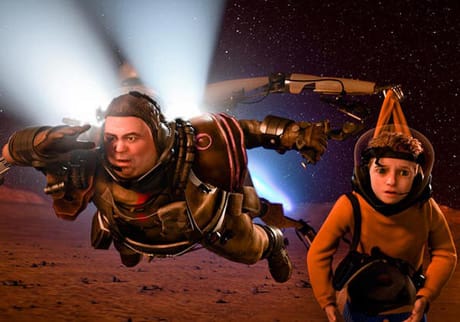Beneath the sterile indoor super-complex where most of the residents of Mars live and work, a vast garbage dump with hundreds of ludicrously mountainous piles is the home for a few rogue, tribal Martians. Dangling precariously on the ceiling is the part-lair, part-tree house of Gribble (Dan Fogler), a man-child who came to Mars to rescue his mom and never went home. With a row of TVs, random Christmas lights and floors, walls and furniture made from whatever crap was lying around (the whole place teeters whenever anyone walks too quickly), this is exactly the structure you might expect an overgrown child to create.
The obvious parallel would be to the underground working-class factory in Metropolis, but there's something about the detail and inventiveness of these underground scenes that calls to mind ― of all things ― Terry Gilliam's Brazil. Meanwhile, on ground level in the repressive Martian society, the indoor streets and hallways have a fluorescent sheen not unlike Tron Legacy, with skyscrapers that would suggest a new architectural style: 21st Century Fascist. One of the reasons that Mars Needs Moms is so surprisingly entertaining is that there's always something beautiful to look at.
This isn't to say that the film doesn't suffer some of the same problems as other Image Movers Digital productions like The Polar Express and A Christmas Carol. It's becoming cliché to rag on the "uncanny valley" effect of the company's image capture animation, but it's still vaguely unsettling to see how closely the Martian-kidnapped mother of our pre-teen hero, Milo (Seth Green), looks like Joan Cusack, except with smoother skin, glassier eyes and very limited facial mobility.
This technology is getting better (note the stubble on Diggler's face and the dirt on his clothes), and the end credits, featuring footage of the actors at work, emphasize how actors collaborate on their animated "performances." But I can't help wondering if the hyper-realistic approach to rendering humans in animation isn't fundamentally misguided.
Still, there's plenty to like about Mars Needs Moms. Milo is, of course, a startlingly adept pre-teen hero, but I like that he's also a bit of a little jerk; he's pissy to his mom, and one of his initial motivations for saving her is that she takes care of him. Gribble is the comedy relief sidekick, but Fogler's vocal performance gives him a sweetness that transcends caricature. The story sounds silly, but it strikes a chord in its evocation of the universal childhood fear of parental abandonment.
I could have done without Ki, Gribble's Martian love interest, who learned English from a flower-power sitcom (is there a more overused cultural stereotype than hippies?), but Mars Needs Moms is a formula family film that gives formula family films a good name.
(Buena Vista)The obvious parallel would be to the underground working-class factory in Metropolis, but there's something about the detail and inventiveness of these underground scenes that calls to mind ― of all things ― Terry Gilliam's Brazil. Meanwhile, on ground level in the repressive Martian society, the indoor streets and hallways have a fluorescent sheen not unlike Tron Legacy, with skyscrapers that would suggest a new architectural style: 21st Century Fascist. One of the reasons that Mars Needs Moms is so surprisingly entertaining is that there's always something beautiful to look at.
This isn't to say that the film doesn't suffer some of the same problems as other Image Movers Digital productions like The Polar Express and A Christmas Carol. It's becoming cliché to rag on the "uncanny valley" effect of the company's image capture animation, but it's still vaguely unsettling to see how closely the Martian-kidnapped mother of our pre-teen hero, Milo (Seth Green), looks like Joan Cusack, except with smoother skin, glassier eyes and very limited facial mobility.
This technology is getting better (note the stubble on Diggler's face and the dirt on his clothes), and the end credits, featuring footage of the actors at work, emphasize how actors collaborate on their animated "performances." But I can't help wondering if the hyper-realistic approach to rendering humans in animation isn't fundamentally misguided.
Still, there's plenty to like about Mars Needs Moms. Milo is, of course, a startlingly adept pre-teen hero, but I like that he's also a bit of a little jerk; he's pissy to his mom, and one of his initial motivations for saving her is that she takes care of him. Gribble is the comedy relief sidekick, but Fogler's vocal performance gives him a sweetness that transcends caricature. The story sounds silly, but it strikes a chord in its evocation of the universal childhood fear of parental abandonment.
I could have done without Ki, Gribble's Martian love interest, who learned English from a flower-power sitcom (is there a more overused cultural stereotype than hippies?), but Mars Needs Moms is a formula family film that gives formula family films a good name.
